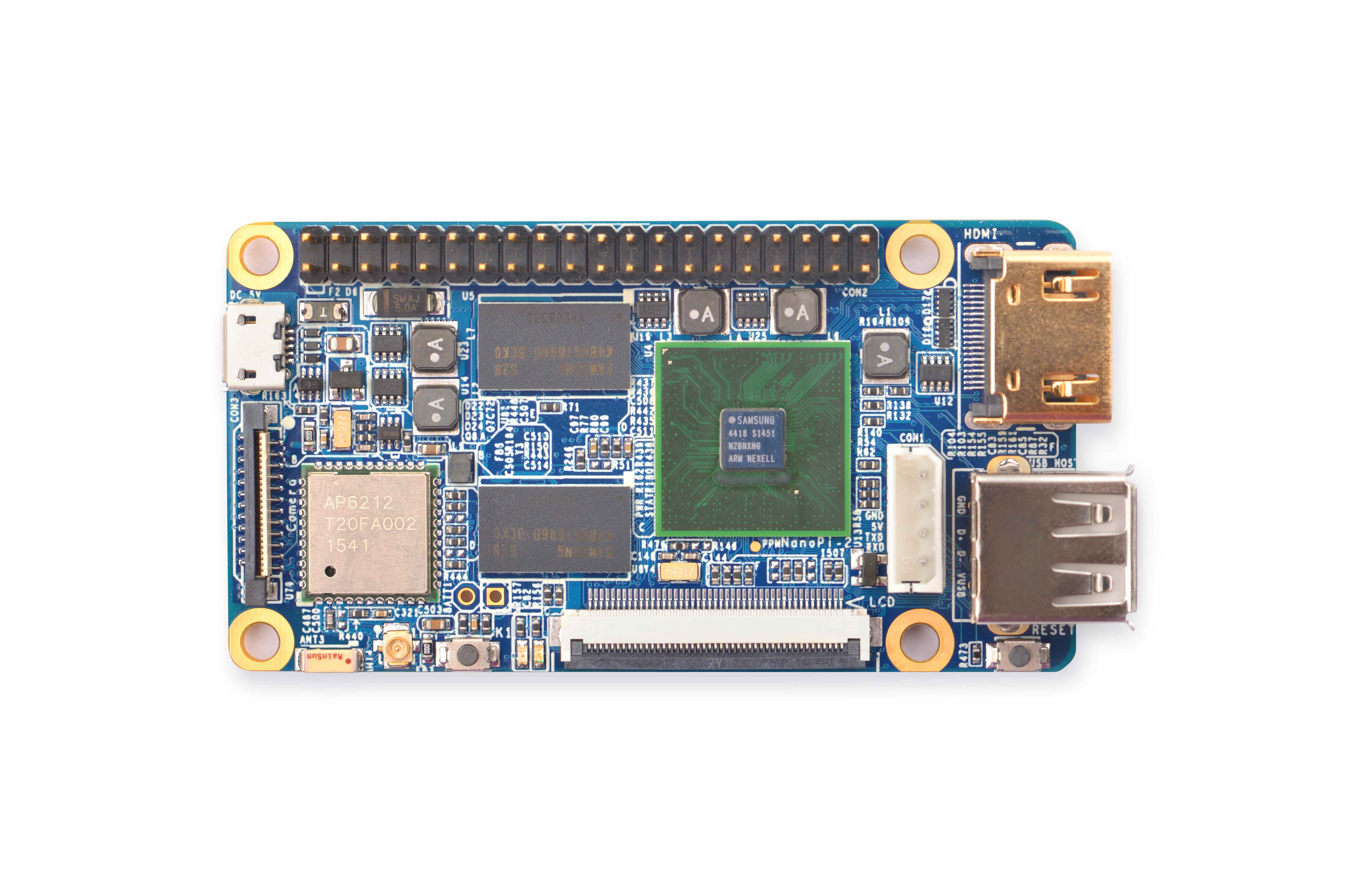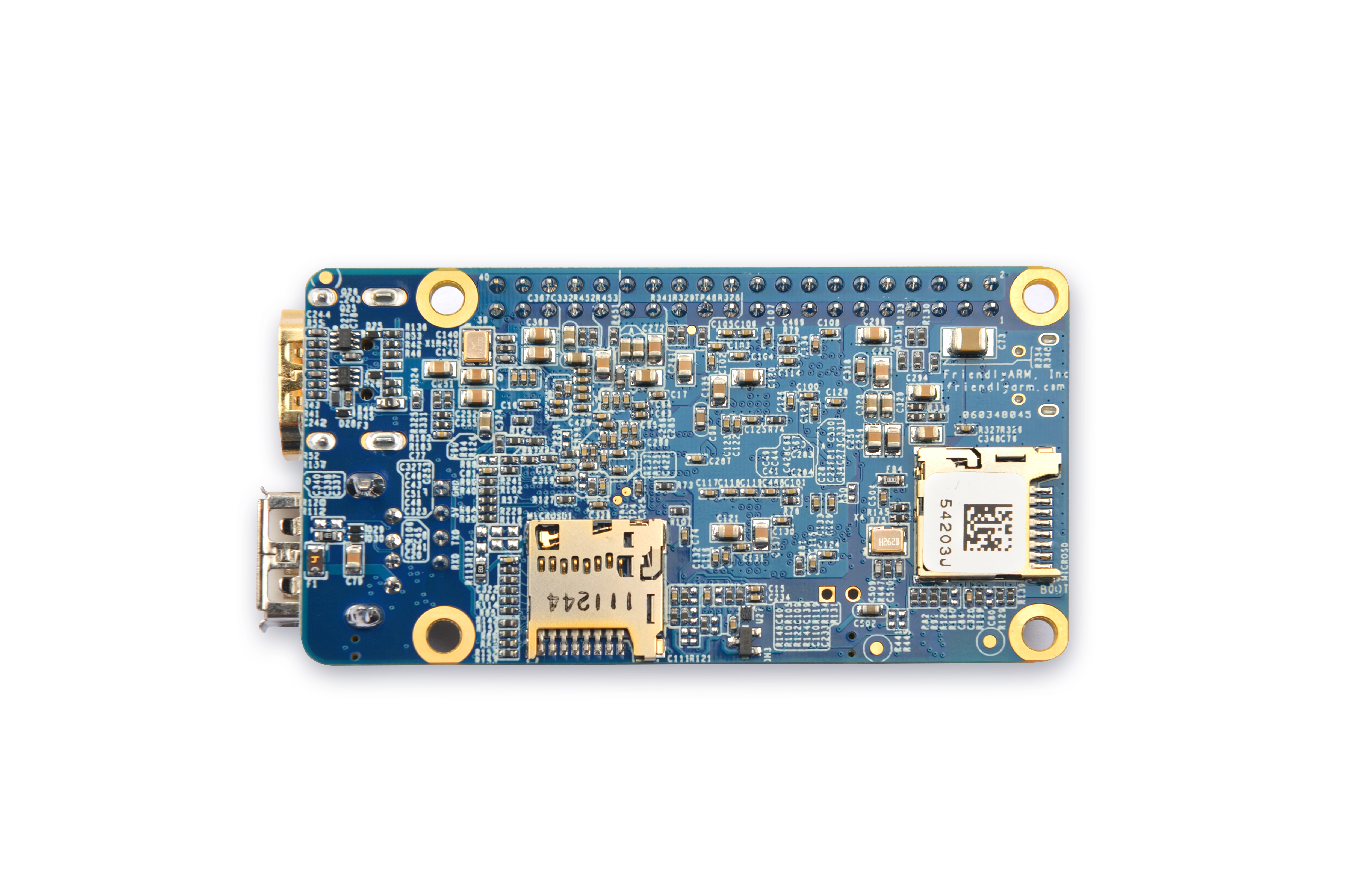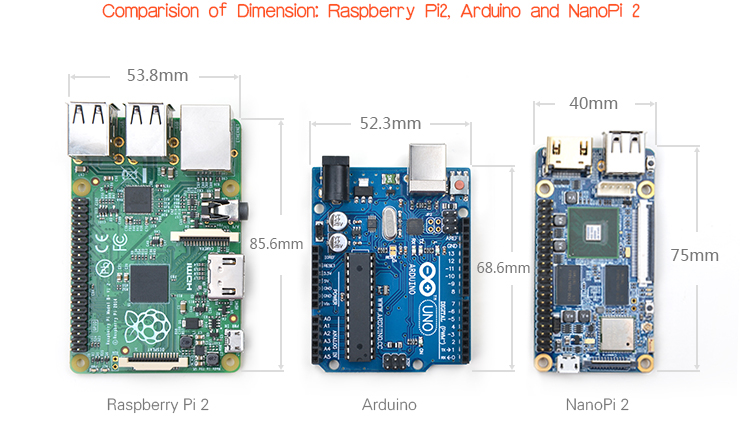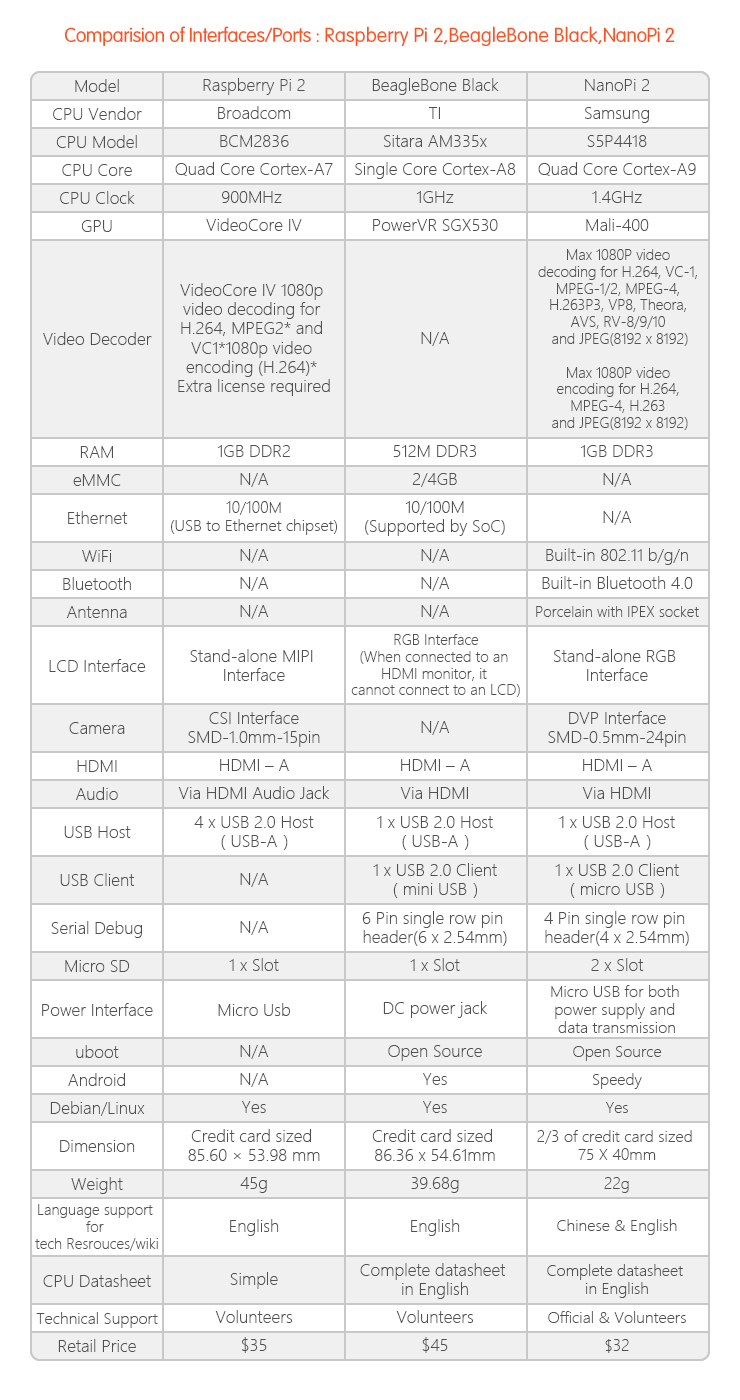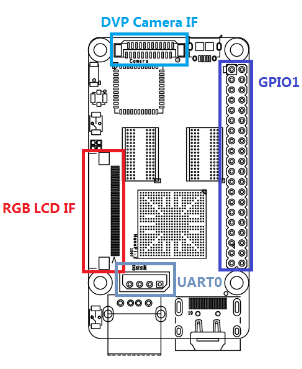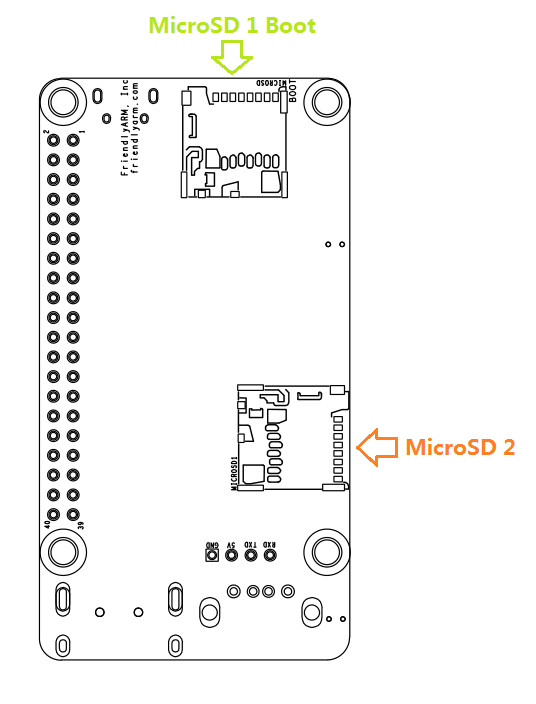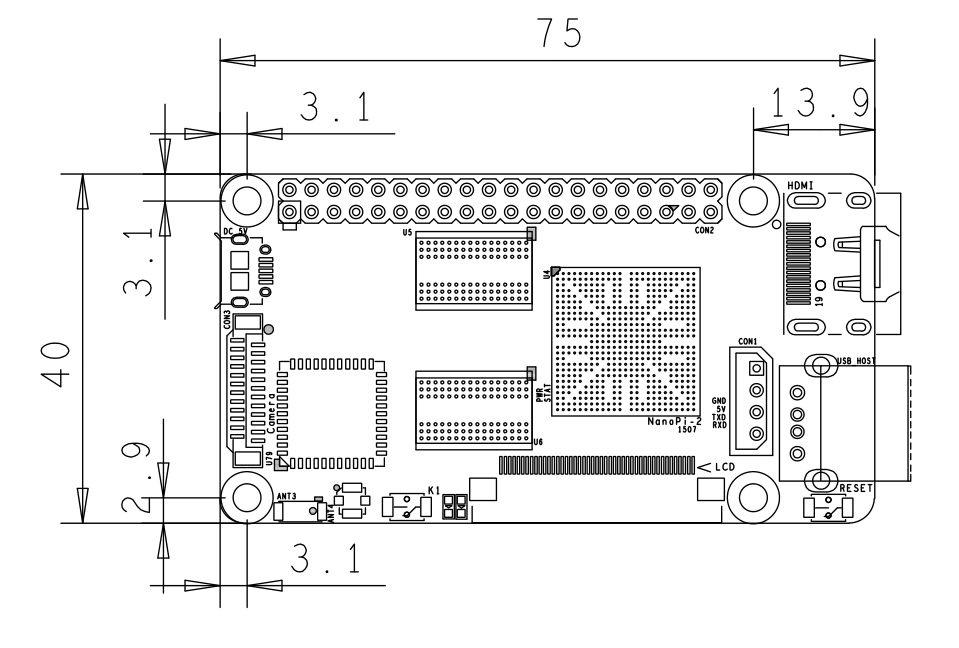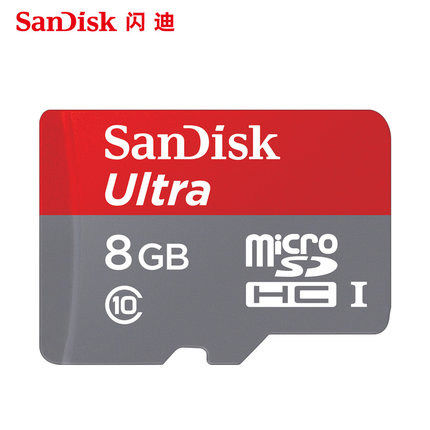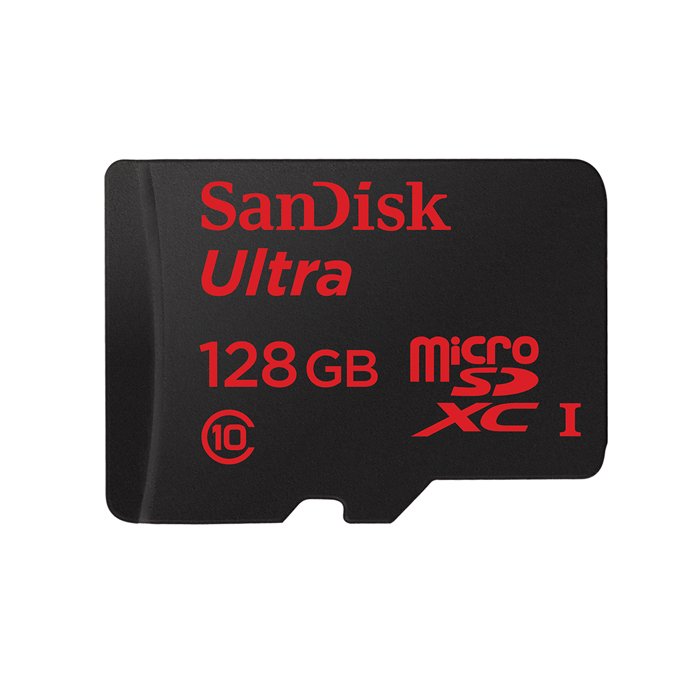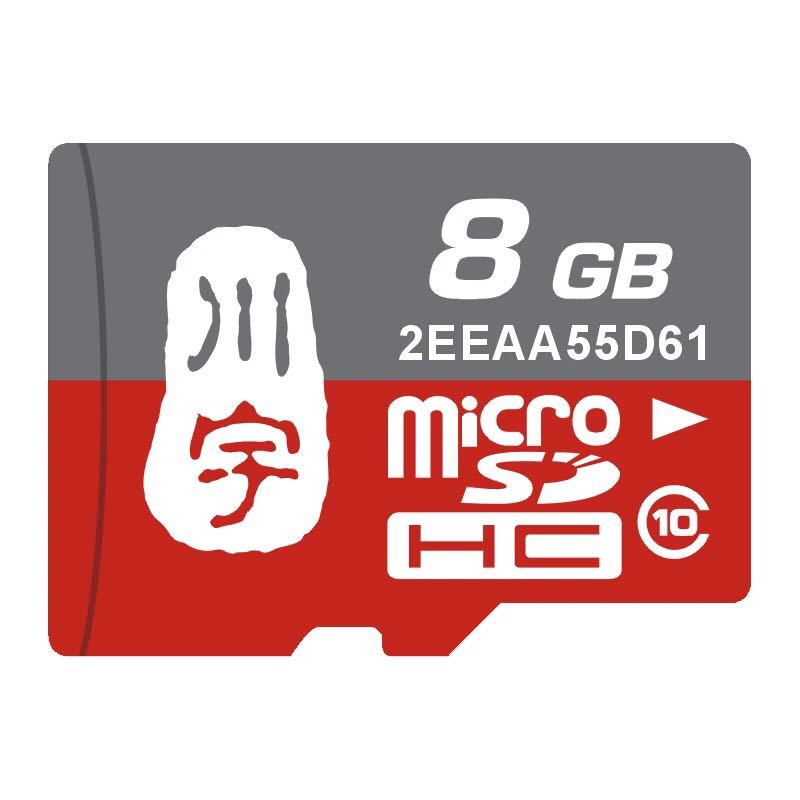NanoPi 2
Contents
- 1 Introduction
- 2 Features
- 3 Diagram, Layout and Dimension
- 4 Get Started
- 5 Working with Debian
- 6 Make Your Own OS Image
- 7 Connect NanoPi 2 to External Modules
- 8 More OS Support
- 9 NanoPi 2 with Python
- 10 FAQ
- 11 Source Code and Image Files Download Links
- 12 Resources
- 13 External Links
- 14 Update Log
1 Introduction
- The NanoPi2 is a high performance ARM Board developed by FriendlyARM for Hobbysts, Makers and Hackers for IOT projects. It features the Samsung Cortex-A9 Quad Core S5P4418@1.4GHz SoC and 1G 32bit DDR3 RAM. It has built-in WiFi and Bluetooth which supports 802.11 b/g/n and Bluetooth 4.0. It boots Android and Debian from a TF card. It integrates an HDMI and LCD interface. Its adoption of the Raspberry Pi’s GPIO pin header makes it compatible with both Raspberry Pi’s external GPIO modules and Arduino’s shield boards. Its PCB dimension is 75 x 40 mm.
2 Features
- CPU: S5P4418, 1.4GHz
- RAM: 1GB DDR3
- Built in SDIO WiFi and Bluetooth module
- USB 2.0 Type A x 1
- Debug Serial Port/UART0 x 1
- microSD Slot x 2
- microUSB x 1: for data transmission and power input
- LCD Interface: 0.5 mm pitch SMT FPC seat, for full-color LCD (RGB: 8-8-8)
- HDMI: HDMI 1.4A, Type-A, 1080P60
- DVP Camera Interface: 0.5mm spacing FPC socket. It includes ITU-R BT 601/656 8-bit, I2C and IO
- GPIO: 2.54mm spacing 40pin, compatible with Raspberry Pi's GPIO. It includes UART, SPI, I2C, IO etc
- Button: User Button x 1, Reset Button x 1
- LED: LED for Power Indication x 1, User LED x 1
- PCB Dimension: 75 x 40mm
- Power: DC 5V/2A
- OS: Android, Debian
3 Diagram, Layout and Dimension
3.1 Layout
- GPIO Pin Spec
Pin# Name Pin# Name 1 VDD_SYS_3.3V 2 VDD_5V 3 I2C0_SDA 4 VDD_5V 5 I2C0_SCL 6 DGND 7 UART4_RX/GPIOB28 8 UART3_TXD/GPIOD21 9 DGND 10 UART3_RXD/GPIOD17 11 UART4_TX/GPIOB29 12 GPIOB26 13 GPIOB30 14 DGND 15 GPIOB31 16 PWM2/GPIOC14 17 VDD_SYS_3.3V 18 GPIOB27 19 SPI0_MOSI/GPIOC31 20 DGND 21 SPI0_MISO/GPIOD0 22 PWM0/GPIOD1 23 SPI0_CLK/GPIOC29 24 SPI0_CS/GPIOC30 25 DGND 26 PWM1/GPIOC13 27 I2C1_SDA 28 I2C1_SCL 29 GPIOC8 30 DGND 31 SPI2_CLK/GPIOC9 32 GPIOC28 33 SPI2_CS/GPIOC10 34 DGND 35 SPI2_MOSI/GPIOC12 36 GPIOC7 37 SPI2_MISO/GPIOC11 38 ALIVEGPIO2 39 DGND 40 ALIVEGPIO3
- Debug Port CON1(UART0)
Pin# Name 1 DGND 2 VDD_5V 3 TXD0 4 RXD0
- DVP Camera Interface Pin Spec
Pin# Name 1, 2 VDD_SYS_3.3V 7,9,13,15,24 DGND 3 SCL0 4 SDA0 5 GPIOB14 6 GPIOB16 8,10 NC 11 VSYNC 12 HREF 14 PCLK 16-23 Data bit7-0
- RGB LCD Interface Pin Spec
Pin# Name Description 1, 2 VDD_5V 5V output, LCD power 11,20,29, 37,38,39,40, 45 DGND ground 3-10 Blue LSB to MSB RGB Blue 12-19 Green LSB to MSB RGB Green 21-28 Red LSB to MSB RGB Red 30 GPIOB25 available for users 31 GPIOC15 occupied by FriendlyARM one wire technology to recognize LCD models and control backlight and implement resistive touch, not applicable for users 32 XnRSTOUT Form CPU low when system is reset 33 VDEN signal the external LCD that data is valid on the data bus 34 VSYNC vertical synchronization 35 HSYNC horizontal synchronization 36 LCDCLK LCD clock, Pixel frequency 41 SCL2 I2C2 clock signal, for capacitive touch data transmission 42 SDA2 I2C2 data signal, for capacitive touch data transmission 43 GPIOC16 interrupt pin for capacitive touch, used with I2C2 44 NC not connected
- Note
- VDD_SYS_3.3V: 3.3V power output
- VDD_5V: 5V power input/output. When the external device’s power is greater than the MicroUSB’s the external device is charging the board otherwise the board powers the external device. The input range is 4.7V ~ 5.6V
- For more details refer to the document:NanoPi-2-1507-Schematic.pdf
3.2 Board Dimension
- For more details please refer to the document:NanoPi-2-1507-Dimesions(dxf).zip
4 Get Started
4.1 Essentials You Need
Before starting to use your NanoPi2 get the following items ready
- NanoPi 2
- microSD Card/TFCard: Class 10 or Above, minimum 8GB SDHC
- microUSB power. A 5V/2A power is a must
- HDMI monitor or LCD
- USB keyboard and mouse
- A host computer running Ubuntu 14.04 64 bit system
4.2 TF Card We Tested
To make your NanoPi 2 boot and run fast we highly recommand you use a Class10 8GB SDHC TF card or a better one. The following cards are what we used in all our test cases presented here:
- SanDisk TF 8G Class10 Micro/SD TF card:
- SanDisk TF128G MicroSDXC TF 128G Class10 48MB/S:
- 川宇 8G C10 High Speed class10 micro SD card:
4.3 Make an Installation MicroSD Card
4.3.1 Under Windows
Get the following files from here:download link to download image files:
For LCD or HDMI output use the following files: nanopi2-debian-sd4g.img.zip Debian image files(there are two Debian files) nanopi2-debian-sd4g.img.zip Debian image files(there are two Debian files) nanopi2-ubuntucore-with-qt-embedded-sd4g.img.zip Ubuntu core image files with Qt-Embedded 4.8.6 GUI No display device connected, use the following files: nanopi2-debian-sd4g-wifiap.img.zip Debian image files (By default WiFi AP is started and users can login via VNC or SSH) Flash Utility: win32diskimager.rar Windows utility. Under Linux users can use "dd"
- Uncompress these files. Insert an SD card(at least 4G) into a Windows PC and run the win32diskimager utility as administrator. On the utility's main window select your SD card's drive, the wanted image file and click on "write" to start flashing the SD card.
- Insert this card into your NanoPi2 and power on (with a 5V/2A power source). If the green LED is on and the blue LED is blinking this indicates your NanoPi2 has successfully booted.
4.3.2 Under Linux Desktop
- 1) Insert your microSD card to your host PC running Ubuntu and check your SD card's device name
dmesg | tail
Search the messages output by "dmesg" for similar words like "sdc: sdc1 sdc2". If you can find them it means your SD card is recognized as "/dev/sdc". Or you can check that by commanding "cat /proc/partitions".
- 2) Download Firmware Package
git clone https://github.com/friendlyarm/sd-fuse_nanopi2.git cd sd-fuse_nanopi2
- 3) Flash Android Firmware to MicroSD Card
su ./fusing.sh /dev/sdx
(Note: you need to replace "/dev/sdx" with the device name in your system) When you do “git clone” you have to hit “Y” within 10 seconds after it prompts you to download image files otherwise you will miss the download.
- 4) Flash Debian Firmware to MicroSD Card
./fusing.sh /dev/sdx debian
4.3.3 Extend NanoPi 2's TF Card Section
4.3.3.1 For Debian
- Run the following commands on a PC host's terminal:
sudo umount /dev/sdx? sudo parted /dev/sdx unit % resizepart 2 100 unit MB print sudo resize2fs -f /dev/sdx2
4.3.3.2 For Android
- Run the following commands on a PC host's terminal:
sudo umount /dev/sdx? sudo parted /dev/sdx unit % resizepart 4 100 resizepart 7 100 unit MB print sudo resize2fs -f /dev/sdx7
(Note: you need to replace "/dev/sdx" with the device name in your system)
4.3.4 Extend NanoPi 2's TF Card Section
- Under Debian run the following commands on a host PC's terminal:
sudo umount /dev/sdx? sudo parted /dev/sdx unit % resizepart 2 100 unit MB print sudo resize2fs -f /dev/sdx2
- Under Android run the following commands on a host PC's terminal:
sudo umount /dev/sdx? sudo parted /dev/sdx unit % resizepart 4 100 resizepart 7 100 unit MB print sudo resize2fs -f /dev/sdx7
(Note: you need to replace "/dev/sdx" with the device name in your system)
4.3.5 LCD/HDMI Resolution
When the system boots our uboot will check whether it is connected to an LCD or an HDMI monitor. If it recognizes an LCD it will configure its resolution. Our uboot defaults to the HDMI 720P configuration.
If you want to modify the LCD resolution you can modify file "arch/arm/plat-s5p4418/nanopi2/lcds.c" in the kernel and recompile it.
If your NanoPi 2 connects an HDMI monitor and it runs Android it will automatically set the resolution to an appropriate HDMI mode by checking the "EDID". If your NanoPi 2 connects an HDMI monitor and it runs Debian by default it will set the resolution to HDMI 720P. If you want to modify the resolution to 1080P modify your kernel's configuration as explained above.
4.4 Update Image Files in MicroSD Card From PC Host
If you want to make some changes to the image files in your MicroSD card follow steps below otherwise you can skip this section.
Insert your MicroSD card into a PC host running Linux, mount the boot and rootfs sections of the SD card and follow the steps below:
1) If you want to change your kernel command line parameters you can do it via the fw_setevn utility under "sd-fuse_nanopi2/tools"
Check the current Command Line:
cd sd-fuse_nanopi2/tools ./fw_printenv /dev/sdc | grep bootargs
Android 5.1.1_r6 starts SELinux. By default it is enforcing. You can change it this way:
./fw_setenv /dev/sdc bootargs XXX androidboot.selinux=permissive
This will set it to "permissive". The "XXX" stands for the original bootargs' value.
2) Update Kernel
Our customized uboot will check the LCD type when it boots.
For a non-Android OS If it recognizes an LCD connected to the NanoPi2 it will load "uImage" from "boot" otherwise it will load "uImage.hdmi"
For Android it doesn't make any difference which display device it detected. You can use your generated uImage to replace the existing one under "boot".
For Debian if your generated kernel is for an LCD you need to replace the existing uImage or if your kernel is for an HDMI monitor you need to replace the existing uImage.hdmi .
4.5 Run Android or Debian
Insert a MicroSD card with Android image files into your NanoPi2, connect the NanoPi2 to an HDMI monitor and a 5V/2A power source the NanoPi2 will be automatically powered on. If you can see the blue LED flashing it means your board is working and you will see Android loading on the HDMI monitor. If at the same time you connect your NanoPi2 to a PC running Ubuntu and Minicom via a serial cable you will see system messages output to the PC’s minicom terminal. Under Debian the password for "root" is "fa".
4.6 Login Debian via VNC or SSH
If your NanoPi 2 is not connected to a display device and it runs the "-wifiap.img" image file you can login to your NanoPi2 at "nanopi2-wifiap" from another device via WIFI. The password for that AP is "123456789". After you successfully connect to your NanoPi2 you can go to this link here to download and install a "VNC Viewer". To login to the NanoPi2 via VNC you need to set the IP address and port to 192.168.8.1:5901 and its default password is "fa123456". Here is a screenshot which shows how it looks like when users login to the NanoPi2 from an iPhone via VNC:
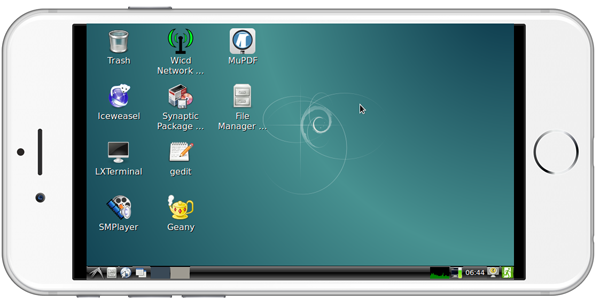
You can login via "SSH -l root 192.168.8.1" too and the default password for "root" is "fa".
To make SSH session run faster turn off the WiFi's power saving mode by using the following command:
iwconfig wlan0 power off
5 Working with Debian
5.1 Wireless Connection
After Debian is fully loaded click on the network icon on top right of the GUI it will automatically search for nearby WiFi sources. Select one source from the list, click on its "Properties", type in its password, save, close and then "Connect". If everything is fine your NanoPi2 will be able to connect to a WiFi source.
The following section only applies to the NanoPi2 which runs the "-wifiap.img" file:
By default the system's WiFi AP mode is on therefore it cannot search and connect to a wireless router. You need to turn off the WiFi AP mode by following the instructions below:
First set up the WiFi router you expect to connect to:
Login to the NanoPi2 via SSH. Check the WiFi device by running the following commands. Those starting with "wlan" are WiFi devices:
ifconfig -a
By default "wlan0" is the Wifi device. You need to create a configuration file with the same name under "/etc/network/interfaces.d/". For instance you can create a "wlan0" file:
vi /etc/network/interfaces.d/wlan0
Here is the wlan0's content:
auto wlan0
iface wlan0 inet dhcp
wpa-ssid YourWiFiESSID
wpa-ap-scan 1
wpa-psk YourWiFiPasswordThe "YourWiFiESSID" and "YourWiFiPassword" need to be replaced with your actual ESSID and password.
If your WiFi password has special characters or you don't want your password saved as plain text you can use "wpa_passphrase" to generate a psk for your WiFi password. Here is how you can do it:
wpa_passphrase YourWiFiESSID
Following the prompt type in your password and you will get some code in the following format. The string after "psk=" is your new password:
network={ ssid="YourWiFiESSID" #psk="YourWiFiPassword" psk=1b66ca678d6f439f7360686ff5eeb7519cdc44b76a40d96515e4eb807a6d408b }
Now you can replace the existing password in the wlan0 file with the new one:
auto wlan0
iface wlan0 inet dhcp
wpa-ssid YourWiFiESSID
wpa-ap-scan 1
wpa-psk 1b66ca678d6f439f7360686ff5eeb7519cdc44b76a40d96515e4eb807a6d408bNext turn off the AP mode. You need to do this as root. Please run the following commands and your system will be rebooted. After your system rebooted it will automatically connect to the WiFi router you set up in your first step:
su
turn-wifi-into-apmode no5.2 Setup Wi-Fi AP
You can follow the steps below to setup Wi-Fi AP:
turn-wifi-into-apmode yesReboot the system as prompted. By default the AP's name is "nanopi2-wifiap" and the password is 123456789.
Now you are able to find the "nanopi2-wifiap" from a PC host and connect to it. If a connection is successful you will be able to SSH to this NanoPi2 at "192.168.8.1":
ssh root@192.168.8.1
The password for it is "fa".
To make SSH session run faster turn off the WiFi's power saving mode by using the following command:
iwconfig wlan0 power off
You can check the WiFi mode via the following command:
cat /sys/module/bcmdhd/parameters/op_mode
If the result is "2" it means it is currently working as a WiFi AP.If you want to switch back to the Station mode you can do it this way:
turn-wifi-into-apmode no
5.3 Bluetooth
Click on the bluetooth icon on right bottom of the GUI a menu will pop up:
Make discoverable enables the NanoPi2 to be searched for by other bluetooth devices;
Devices... opens a search window and searches for nearby bluetooth devices(Note: the "Make discoverable" property needs to be enabled on those nearby devices):
Send Files to Device...enables the NanoPi2 to send files to another bluetooth device which is a pair of the NanoPi2.
5.4 Install Debian Packages
We provide a Debian Jessie image. You can install Jessie's packages by commanding "apt-get". If this is your first installation you need to update the package list by running the following command:
apt-get updateYou can install your preferred packages. For example if you want to install an FTP server you can do this:
apt-get install vsftpdNote: you can change your download server by editting "/etc/apt/sources.list". You can get a complete server list from [1]. You need to select the one with "armhf".
5.5 HDMI Audio Output/3.5mm Audio Jack Output Under Debian
By default our Debian system's HDMI output doesn't have audio output. To enable the HDMI audio output you need to install the alsa packages
Firstly, make sure your board runs our latest Debian image and is connected to the internet:
After your board is powered up run the following commands:
apt-get update apt-get install libasound2 apt-get install alsa-base apt-get install alsa-utils
After the installation is done copy a ".wav" audio file to your NanoPi 2, connect your NanoPi 2 to an HDMI monitor and play it by using the following command:
aplay music.wav6 Make Your Own OS Image
6.1 Setup Development Environment
6.2 Install Cross Compiler
Download the compiler package:
git clone https://github.com/friendlyarm/prebuilts.git sudo mkdir -p /opt/FriendlyARM/toolchain sudo tar xf prebuilts/gcc-x64/arm-cortexa9-linux-gnueabihf-4.9.3.tar.xz -C /opt/FriendlyARM/toolchain/
Then add the compiler's directory to "PATH" by appending the following lines in "~/.bashrc":
export PATH=/opt/FriendlyARM/toolchain/4.9.3/bin:$PATH export GCC_COLORS=auto
Execute "~/.bashrc" to make the changes take effect. Note that there is a space after the first ".":
. ~/.bashrcThis compiler is a 64-bit one therefore it cannot be run on a 32-bit Linux machine. After the compiler is installed you can verify it by running the following commands:
arm-linux-gcc -v Using built-in specs. COLLECT_GCC=arm-linux-gcc COLLECT_LTO_WRAPPER=/opt/FriendlyARM/toolchain/4.9.3/libexec/gcc/arm-cortexa9-linux-gnueabihf/4.9.3/lto-wrapper Target: arm-cortexa9-linux-gnueabihf Configured with: /work/toolchain/build/src/gcc-4.9.3/configure --build=x86_64-build_pc-linux-gnu --host=x86_64-build_pc-linux-gnu --target=arm-cortexa9-linux-gnueabihf --prefix=/opt/FriendlyARM/toolchain/4.9.3 --with-sysroot=/opt/FriendlyARM/toolchain/4.9.3/arm-cortexa9-linux-gnueabihf/sys-root --enable-languages=c,c++ --with-arch=armv7-a --with-tune=cortex-a9 --with-fpu=vfpv3 --with-float=hard ... Thread model: posix gcc version 4.9.3 (ctng-1.21.0-229g-FA)
6.3 Compile U-Boot
Download the U-Boot source code and compile it. Note that the github's branch is nanopi2-lollipop-mr1:
git clone https://github.com/friendlyarm/uboot_nanopi2.git cd uboot_nanopi2 git checkout nanopi2-lollipop-mr1 make s5p4418_nanopi2_config make CROSS_COMPILE=arm-linux-
After your compilation succeeds a u-boot.bin will be generated. If you want to test it flash it to your installation MicroSD card via fastboot. Here is how you can do it:
1) On your PC host run "sudo apt-get install android-tools-fastboot" to install the fastboot utility
2) Connect your NanoPi2 to your PC host via a serial cable (e.g. PSU-ONECOME). Press the enter key within two seconds right after you power on your NanoPi 2 and you will enter uboot's command line mode:
3) After type "fastboot" and press "enter" you will enter the fastboot mode:
4) Connect your NanoPi2 to this PC host via a microUSB cable and type in the following command to flash u-boot.bin:
fastboot flash bootloader u-boot.bin
Warning: you cannot update this MicroSD card by commanding "dd". This command will cause trouble when booting the NanoPi2.
6.4 Prepare mkimage
You need the mkimage utility to compile a U-Boot source code package. Make sure this utility works well on your host before you start compiling a uImage.
You can install this utility by either commanding "sudo apt-get install u-boot-tools" or following the commands below:
cd uboot_nanopi2 make CROSS_COMPILE=arm-linux- tools sudo mkdir -p /usr/local/sbin && sudo cp -v tools/mkimage /usr/local/sbin
6.5 Compile Linux kernel
6.5.1 Compile Kernel
- Download Kernel Source Code
git clone https://github.com/friendlyarm/linux-3.4.y.git cd linux-3.4.y git checkout nanopi2-lollipop-mr1
The NanoPi2's kernel source code lies in the "nanopi2-lollipop-mr1" branch.
- Compile Android Kernel
make nanopi2_android_defconfig touch .scmversion make uImage
- Compile Debian Kernel
make nanopi2_linux_defconfig touch .scmversion make uImage
After your compilation succeeds a uImage will be generated in the "arch/arm/boot/uImage" directory. This kernel is for an HDMI monitor. You can use it to replace the existing uImage.hdmi
If you want to generate a kernel for an LCD you can do it this way:
touch .scmversion make nanopi2_linux_defconfig make menuconfig Device Drivers --> Graphics support --> Nexell Graphics --> [*] LCD [ ] HDMI make uImage
After your compilation succeeds a uImage will be generated for an HDMI monitor. You can use it to replace the existing uImage.
6.5.2 Compile Kernel Modules
Android contains kernel modules which are in the "/lib/modules" directory in the system section. If you want to add your own modules to the kernel or you changed your kernel configurations you need to recompile these new modules.
Compile Original Kernel Modules:
cd linux-3.4.y make CROSS_COMPILE=arm-eabi- modules
Here we have two new modules and we can compile them by following the commands below:
cd /opt/FriendlyARM/s5p4418/android ./vendor/friendly-arm/build/common/build-modules.sh
The "/opt/FriendlyARM/s5p4418/android" directory points to the top directory of Android source code. You can get more details by specifying option "-h".
After your compilation succeeds new modules will be generated
6.6 Compile Android
- Install Cross Compiler
Install 64 bit Ubuntu 14.04 on your PC host.
sudo apt-get install bison g++-multilib git gperf libxml2-utils make python-networkx zip sudo apt-get install flex libncurses5-dev zlib1g-dev gawk minicom
For more details refer to https://source.android.com/source/initializing.html 。
- Download Source Code
You need to use repo to get the Android source code. Refer to https://source.android.com/source/downloading.html 。
mkdir android && cd android repo init -u https://github.com/friendlyarm/android_manifest.git -b nanopi2-lollipop-mr1 repo sync
The "android" directory is the working directory.
- Compile System Package
source build/envsetup.sh lunch aosp_nanopi2-userdebug make -j8
After your compilation succeeds an image will be generated in the "out/target/product/nanopi2/" directory.
7 Connect NanoPi 2 to External Modules
7.1 Connect NanoPi 2 to USB Camera(FA-CAM202)
- In this usecase the NanoPi 2 runs Debian. If you connect your NanoPi 2 to our LCD after Debain is fully loaded click on "other"-->"xawtv9" on the left bottom of the GUI and the USB Camera application will be started. After enter "welcome to xawtv!" click on "OK" to start exploring.
For more details about this USB camera refer to this link
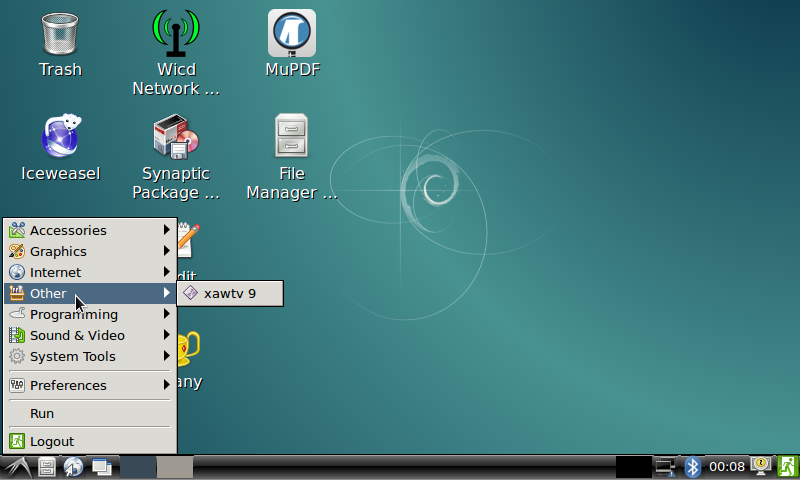
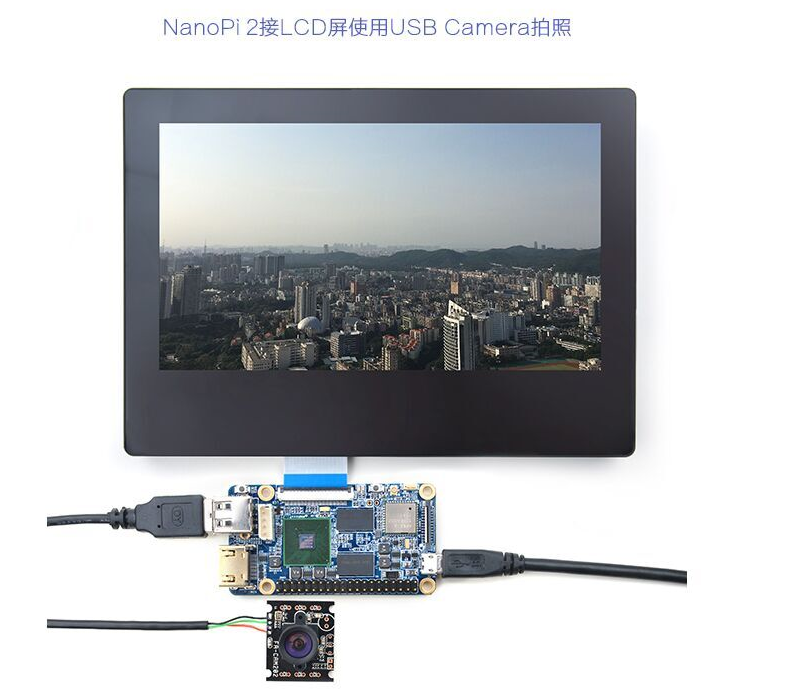
7.2 Connect NanoPi 2 to CMOS 5M-Pixel Camera
- In this usecase the NanoPi 2 runs Android5.1. If you connect your NanoPi 2 to our LCD after Android is fully loaded click on the "Camera" icon the application will be started.
For more details about the CAM500A camera refer to this link
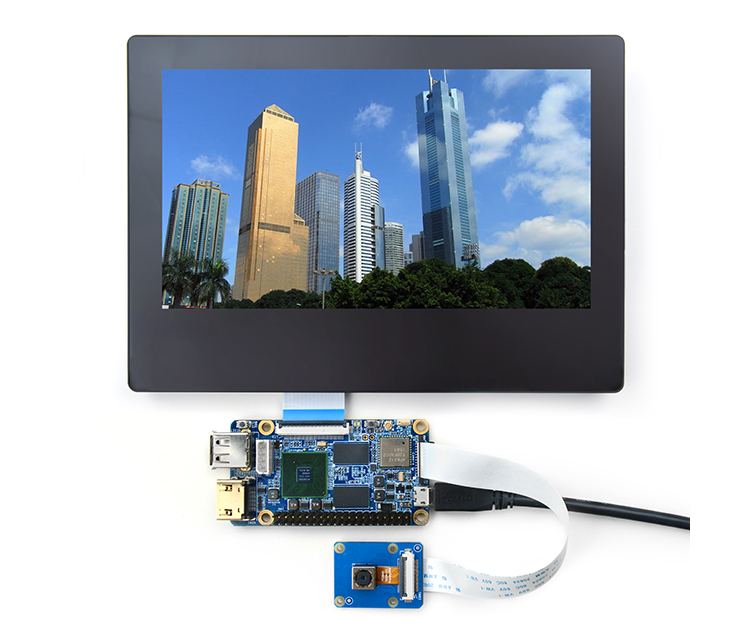
7.3 Use OpenCV to Access USB Camera
- The full name of "OpenCV" is Open Source Computer Vision Library and it is a cross platform vision library.
- When the NanoPi 2 runs Debian users can use OpenCV APIs to access a USB Camera device
Here is a guideline on how to use OpenCV with C++ on the NanoPi 2
1. Preparations
---Firstly you need to make sure your NanoPi 2 is connected to the internet. Login to your NanoPi 2 via a serial terminal or SSH. After login type in your username(root) and password(fa): ---Run the following commands:
#apt-get update (The OS images we provide for the NanoPi 2 by default have the vi utility. However we suggest you install the vim utility) #apt-get install vim #apt-get install libcv-dev libopencv-dev
2. Make sure your USB camera works with the NanoPi 2. You can test your camera with NanoPi 2's camera utility.
3. Check your camera device:
#ls /dev/video + "Tab" key (This lists available USB camera devices. In our test case video9 was available and video0 to video8 were occupied)
4. OpenCV's code sample:
#cd /home/fa #vim test.cpp
#include "opencv2/opencv.hpp" using namespace cv; int main(int, char**) { VideoCapture cap(0); // open the default camera if(!cap.isOpened()) // check if we succeeded return -1; Mat edges; namedWindow("edges",1); for(;;) { Mat frame; cap >> frame; // get a new frame from camera cvtColor(frame, edges, CV_BGR2GRAY); GaussianBlur(edges, edges, Size(7,7), 1.5, 1.5); Canny(edges, edges, 0, 30, 3); imshow("edges", edges); if(waitKey(30) >= 0) break; } // the camera will be deinitialized automatically in VideoCapture destructor return 0; }
Compile the code sample:
#g++ test.cpp -o test -lopencv_core -lopencv_highgui -lopencv_imgproc
If it is compiled successfully a "test" executable will be generated:
5. Note: the NanoPi 2 has nine video devices. However this OpenCV's code sample defines a maximum of 8 cameras can be accessed therefore one video needs to be removed. Here we removed video0
#rm /dev/video0 #mv /dev/video9 /dev/video0
6. Connect NanoPi 2 to USB Keyboard & Run the Following Command:
#./test
This is what you expect to observe:
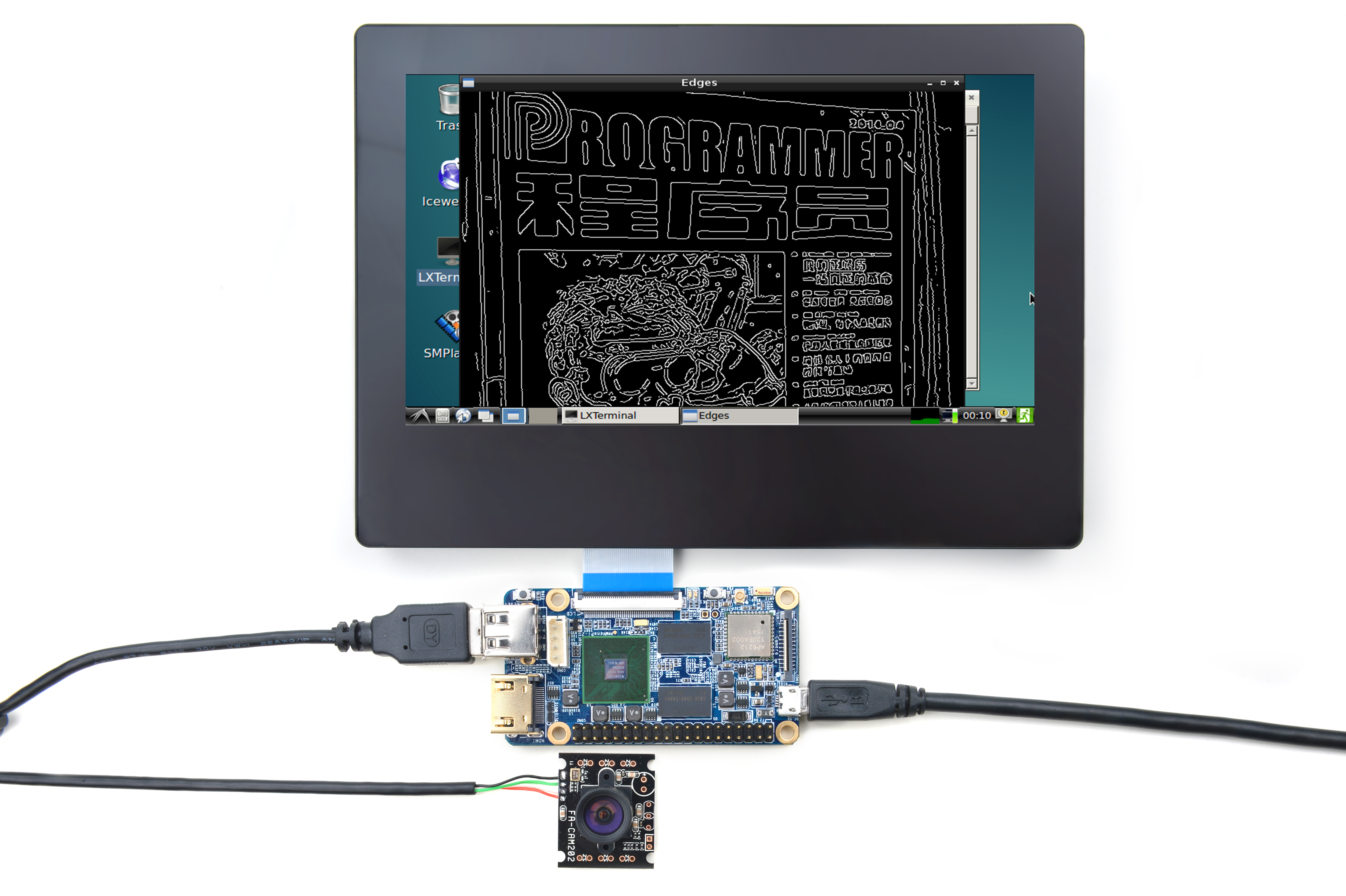
7.4 Connect NanoPi 2 to Matrix GPS Module
- The Matrix-GPS module is a small GPS module with high performance. It can be used in navigation devices, four-axle drones and etc.
- The Matrix-GPS module uses serial communication. When the NanoPi 2 is connected to the Matrix GPS module, after the NanoPi 2 is powered up type in the following command in a terminal or click on the xgps icon it will be started.
$su - fa -c "DISPLAY=:0 xgps 127.0.0.1:9999"
- Or on the Debian GUI start the LXTerminal, type in "xgps" and enter it will be started too.
For more details about this GPS module refer to this link
Refer to the following diagram to connect the NanoPi 2 to the Matrix-GPS:
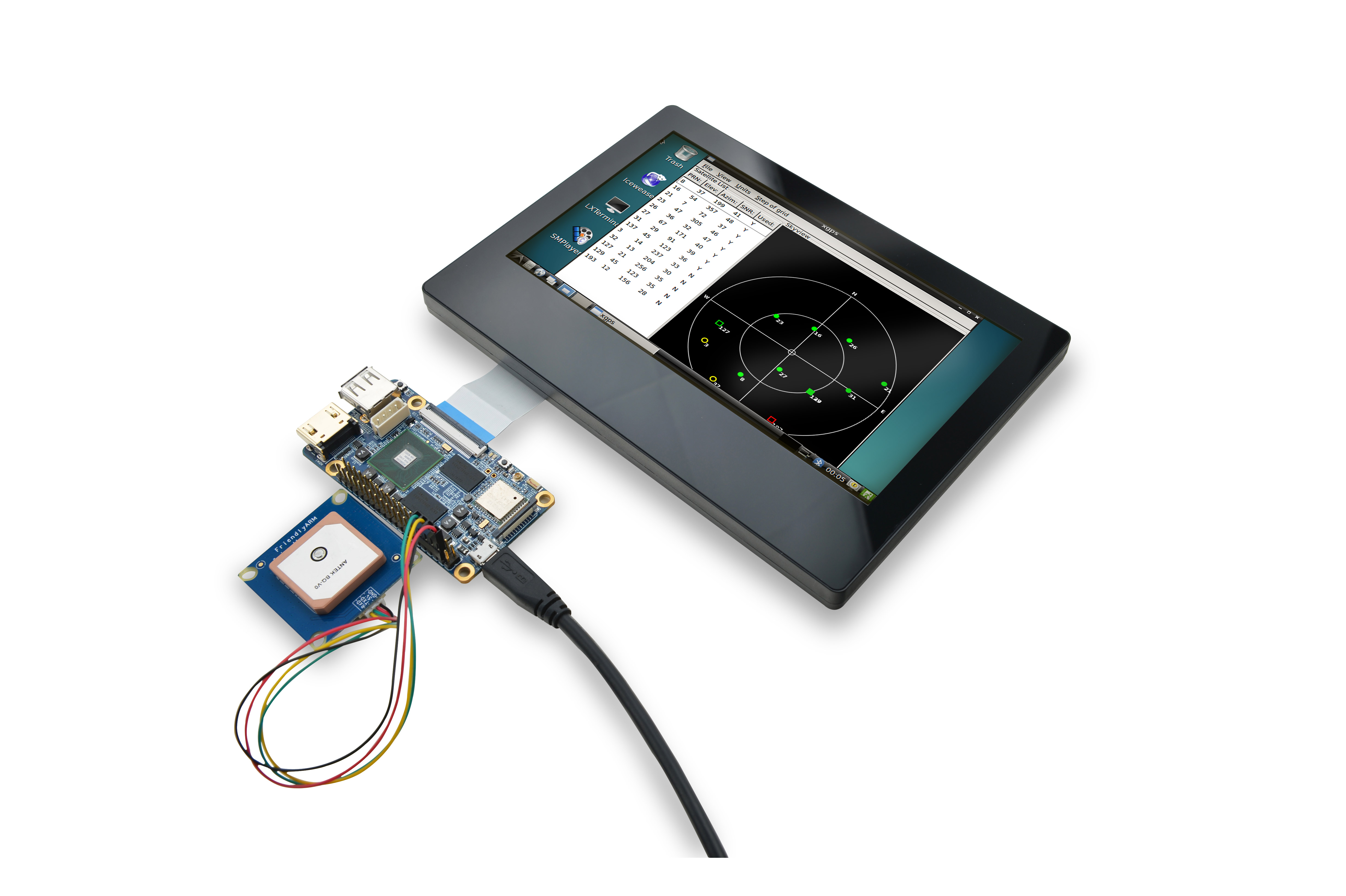
Connection Details:
| Matrix-GPS | NanoPi 2 |
| RXD | Pin8 |
| TXD | Pin10 |
| 5V | Pin4 |
| GND | Pin6 |
7.5 NanoPi 2使用I2C通讯设备
- Matrix - I2C LCD1602 Keypad由液晶显示屏模块LCD1602和IIC扩展模块MCP23017构成,同时集成5个可独立编程按键,使用这些按键可以控制接在板子上的外设模块或者控制LCD显示的字符。
- Matrix - I2C LCD1602 Keypad使用I2C通讯,达到节约IO资源和简化控制的目的。通过此模块,可更清楚的了解NanoPi 2使用I2C设备如何通讯。
Matrix - I2C LCD1602 Keypad IIC通讯模块的详情请查看点击查看
参考下图连接模块Matrix-I2C_LCD1602_Keypad和NanoPi 2:
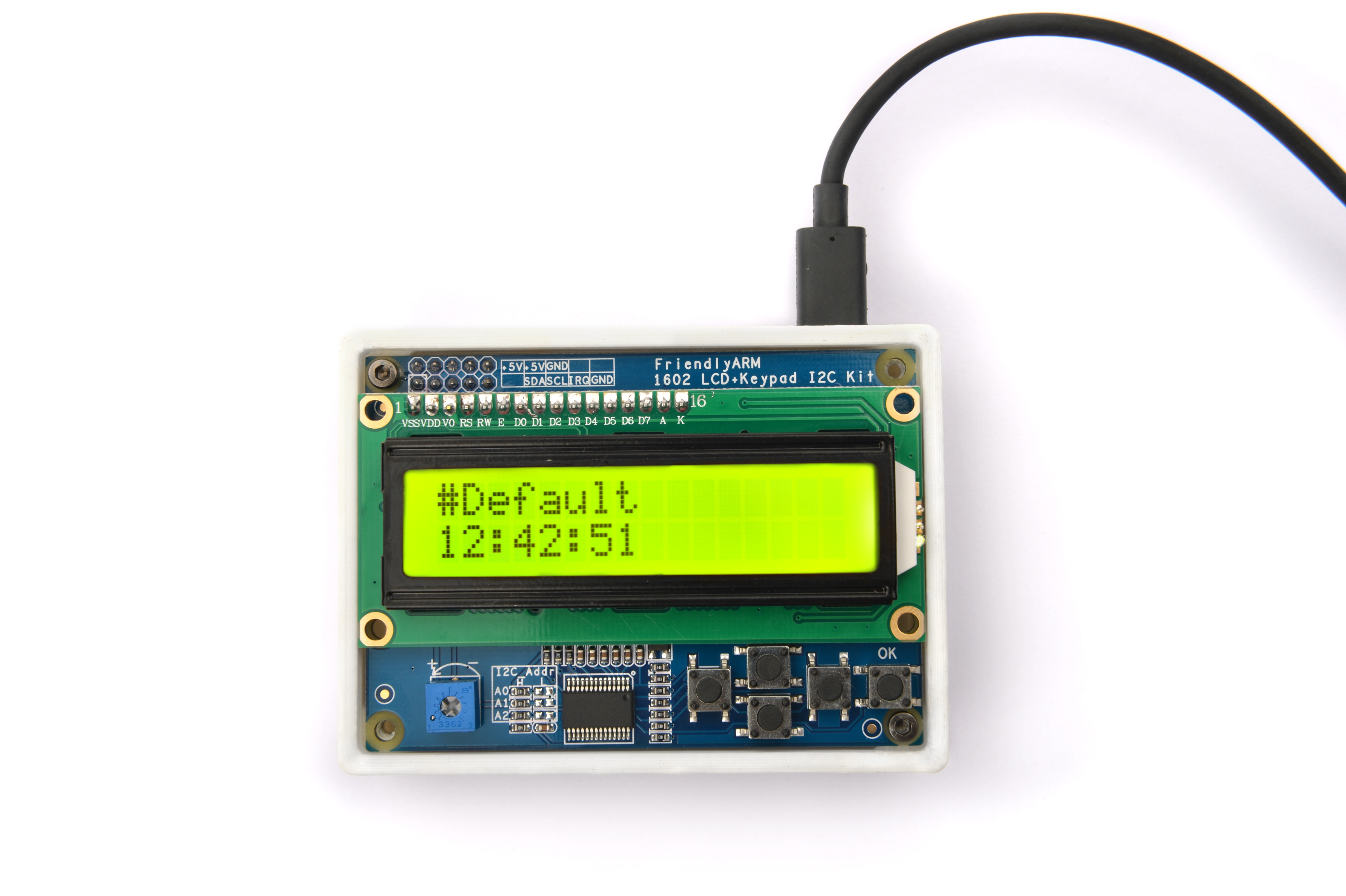
连接说明:
| Matrix-I2C_LCD1602_Keypad | NanoPi 2 |
| SDA | Pin3 |
| SCL | Pin5 |
| 5V | Pin4 |
| GND | Pin6 |
7.6 NanoPi 2使用SPI通讯设备
- Matrix-2'8_SPI_Key_TFT模块是一款2.8英寸的TFT 触摸LCD,模块采用ST7789S驱动IC和XPT2046电阻式触摸IC,屏幕分辨率为320*240,采用SPI控制接口,模块还包含3个独立按键,可根据需要自定义功能。
Matrix-2'8_SPI_Key_TFT SPI通讯模块的详情请查看点击查看
参考下图连接模块Matrix-2'8_SPI_Key_TFT和NanoPi 2:
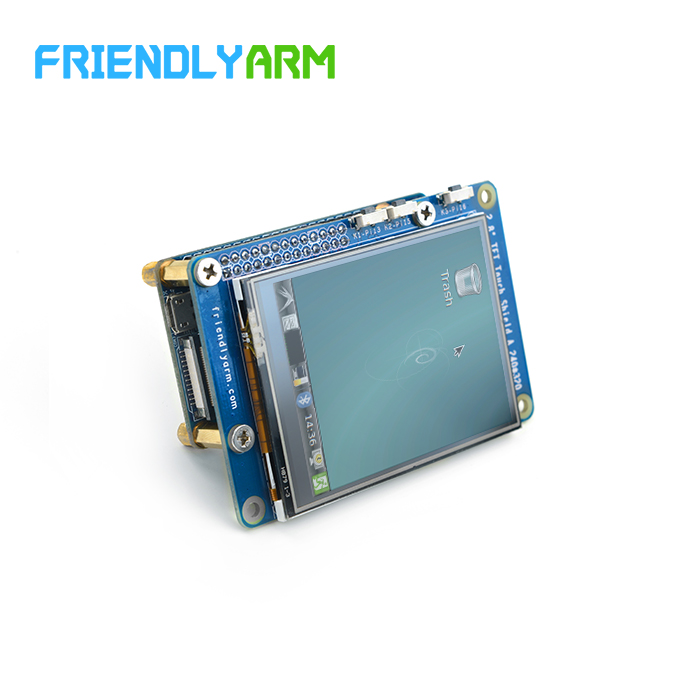
连接说明:
| Matrix-2'8_SPI_Key_TFT | NanoPi 2 |
| GND | Pin6 |
| 5V | Pin2 |
| LED_EN | Pin11 |
| LCD_RESET | Pin7 |
| LCD_D/C | Pin22 |
| LCD_CS | Pin24 |
| SPICLK | Pin23 |
| SPIMOSI | Pin19 |
| SPIMISO | Pin21 |
| T_CS | Pin26 |
| T_IRQ | Pin18 |
8 More OS Support
8.1 Ubuntu-Mate
- Go to this link [2] to download the image files
- Uncompress it and flash the image file to a TF card with win32diskimager under Windows
- After it is done you can boot your NanoPi 2 with this card
- Login name: "root" or "fa", Password: fa
Note: this UbuntuMate works with both NanoPi 2 and NanoPi 2 Fire
8.2 Kali
- Go to this link [3] to download the image files
- Prepare an 8G High Speed MicroSD card, insert it into a Linux host and do "sudo fdisk -l" to check its device name, i.e. "/dev/sd*"
- Copy the image files to the card by running the following commands as root:
xzcat kali-2.0-nanopi2.img.xz | dd of=<YOURDEVICE> bs=1m
- After it is done you can boot your NanoPi 2 with this card.
Note: this is offered by Kali and FriendlyARM doesn't provide technical support for it.
8.3 Deepin15 ARM
- Go to this link [4] to download the image files
- Uncompress the file and you will get a 16g.img file which is the image file for MicroSD card.
tar -xf deepin15_nanopi2_armhf_16g.tar.gz
- Prepare an 16G High Speed MicroSD card, insert it into a Linux host and do "sudo fdisk -l" to check its device name, i.e. "/dev/sd*"
- Flash the image files to the card by running the following command as root(in our case our card was recognized as "/dev/sdc"):
sudo dd if=16g.img of=/dev/sdc
(This process takes a while which can be up to one hour)
- After it is done you can boot your NanoPi 2 with this card
Notes:
1. The password for login name "deepin" is "deepin". The password for login name "root" is "admin".
2. The initial booting of Deepin15 takes a relative long time for it generates some configuration files.
3. If WiFi is activated in your system booting might take longer. In this case wait for the sound and wifi icons on the right bottom of the GUI to appear before you start any action.
ARM code: http://packages.deepin.com/armhf/ NanoPi 2 Image: http://cdimage.deepin.com/armhf/15/beta1.0/ NanoPi 2 Image Installation Instruction; http://bbs.deepin.org/forum.php?mod=viewthread&tid=36670 Forum for Migrating Deepin15 to ARM: http://bbs.deepin.org/
Note: this is offered by the Deepin15 team and FriendlyARM doesn't provide technical support for it.
9 NanoPi 2 with Python
- You can write Python code to control Compact Kit[5]
10 FAQ
- Common Issues
Where to download image files? The NanoPi 2 has a wiki site which has all the necessary information and details about everything. Its link is :http://wiki.friendlyarm.com/wiki/index.php/NanoPi_2 After the board is powered on the blue LED is not on 1. The power is not enough or instable. A 5V/2A power is a must;
2. The TF card is not a high speed one. Use an 8G (or above) microSD Card/TFCard, Class 10 (or Above);
3. Try our latest image files;
4. Contact our techsupport at techsupport@friendlyarm.comAfter the board is powered on the blue LED is on but not blinking 1. The power is not enough or instable. A 5V/2A power is a must;
2. The TF card is not a high speed one. Use an 8G (or above) microSD Card/TFCard, Class 10 (or Above);
3. Try our latest image filesWhen the board doesn’t connect any display device it can boot normally and output system messages to the serial port. However when it connects an LCD the LCD doesn’t display anything or reboots frequently before it fully loads an OS. 1. The power is not enough or instable. A 5V/2A power is a must;
2. Check whetherthe FPC cable is properly connected or whether it is broken or not;
3. Connect the board to a PC via a serial cable and check whether the LCD is recognized by the board.When the board doesn’t connect an LCD it can boot normally and output system messages to the serial port. However when it connects an HDMI monitor the monitor doesn’t display anything 1. You can try connecting your board to a monitor with DVI interface with an HDMI to DVI cable
2. Use a monitor which has an HDMI interface
When the board runs Debian HDMI doesn’t have audio output Our Debian system currently doesn’t support HDMI audio because we didn’t include HDMI’s audio package When the board runs Android HDMI doesn’t support volume control. Our Android system currently doesn’t support HDMI’s volume control. Users can adjust it via a remote control
11 Source Code and Image Files Download Links
12 Resources
- image files
- SEC_Users_Manual_S5P4418_Users_Manual_Preliminary([8])
- Schematic (NanoPi-2-1507-Schematic.pdf)
- Dimensions (NanoPi-2-1507-Dimesions(dxf).zip)
- SOC Datasheet (Pi2_SOC_DS_0.1.pdf)
- AP6212 Datasheet (AP6212_V1.1_09022014.pdf)
- NanoPi2-Component-bot ([9])
- NanoPi2-Component-top ([10])
- External Modules and Development Documents:
13 External Links
- Kali Linux's Image for NanoPi 2
- How to setup Qt development environment for NanoPi 2 & NanoPi 2 Fire
14 Update Log
14.1 Dec-01-2015
- Released Android 5.1.1_r6. The source code has been pushed to https://github.com/friendlyarm
- 4.2.1: Combined originally individual HDMI image and LCD image to one
- 4.3: Updated steps on how to make changes in image files in SD card
- 6: Updated code branch to "nanopi2-lollipop-mr1"
- 6.4.2: Added Debian uImage that supports LCD
14.2 Jan-29-2016
- Add 9 More OS Support
14.3 Feb-02-2016
- Add 9.1 UbuntuMate
- Add 11 External Links
14.4 Mar-17-2016
- Updated Kali, UbuntuMate and Deepin15 download links
14.5 Mar-18-2016
- Modified section 4.3.1
- Added sections 10, 11 and 12
14.6 Mar-29-2016
- Corrected expression errors

